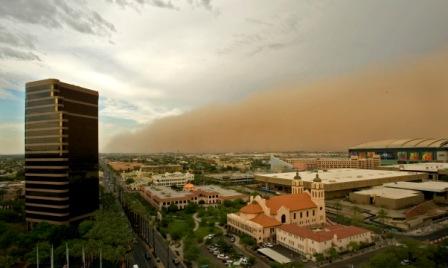 Note: This week is National Public Health Week. This week I have a five-part public health series that explores the vast network of programs and services that help improve the health and wellness of all Arizonans.
Note: This week is National Public Health Week. This week I have a five-part public health series that explores the vast network of programs and services that help improve the health and wellness of all Arizonans.
Arizona is a diverse state with a wide range of weather. This can lead to extreme heat in the desert areas during the summer, unpredictable flooding during monsoon season, and devastating wildfires during drought conditions. This is where the Extreme Weather and Public Health team comes in. We address these issues throughout the year to help keep residents and visitors healthy in extreme conditions.
Summer temperatures can cause heat-related illnesses that send more than 2,000 people to the emergency room annually. We send out heat alerts with safety messages on how to prevent, recognize, and treat a heat-related illness like heat exhaustion or heat stroke. Our SunWise program promotes sun safety through wearing protective clothing during times when the sun’s UV rays are the strongest. Their school program provides resources and educational activities to reduce skin cancer as well as staff trainings and assemblies.
Quick moving monsoon storms produce a lot of rainfall which can rapidly fill washes and low areas of roads, posing major hazards. Take precautions before a flood by creating a disaster supply kit. During a flood, take precautions by staying away from flooded areas as well as anything that may have come into contact with flood water. Flash floods can not only cause structural damage but can lead to other issues such as increases in mosquito–borne illnesses. Dump standing water to prevent mosquito breeding, wear insect repellent, and keep your arms and legs covered.
Hot temperatures and drought conditions make Arizona susceptible to wildfires causing landslides, destroying homes, threatening the public welfare and causing lasting economic damage. We’ve taken action by creating the Wildfire Emergency Response Plan which directs us in the event of wildfire emergency. Fires produce a high level of pollutants that can cause severe respiratory and cardiovascular problems. Beyond smoke from fires, we also collaborate with state partners in promoting efforts to protect the public from air quality issues which can make respiratory conditions, like asthma, worse.
Environmental health hazards are often caused by natural events so while not preventable we can take precautions. This includes keeping hydrated and staying out of the sun during hot times of the year, but also protecting your skin from the harmful UV rays year-round.
Precautions should always be taken during a flash flood as water flows quickly and can be deceiving. Finally take precautions on bad air quality days. Wildfires, dust and other allergens can cause issues as well. You can also make a difference.
There are simple steps you can take to protect yourself and your family during weather emergencies. Planning, preparing an emergency kit, and staying informed of hazards can better prepare you for emergencies and disasters. Check back tomorrow for the last in my five-part National Public Health Week series.









